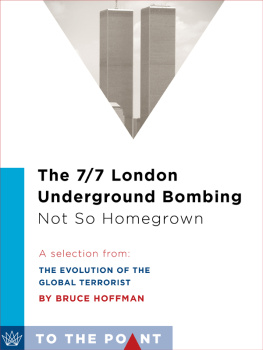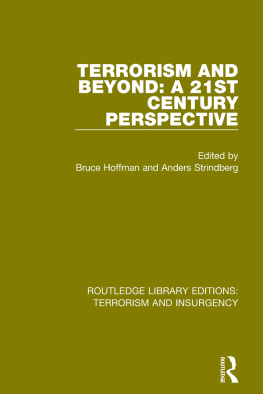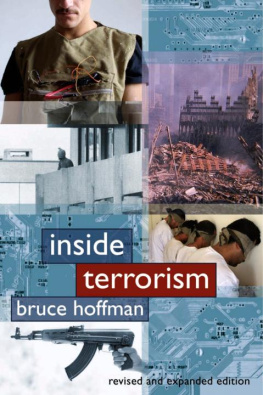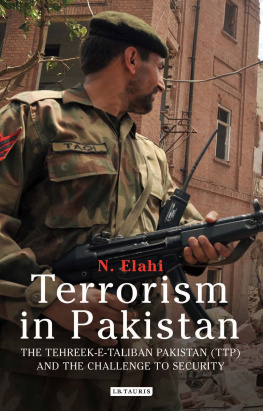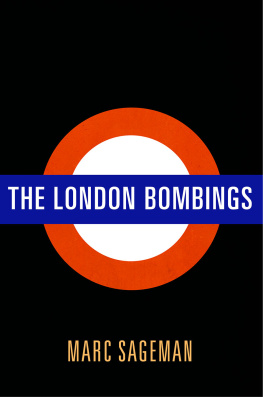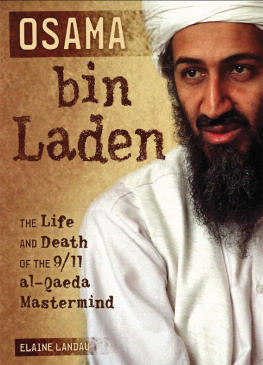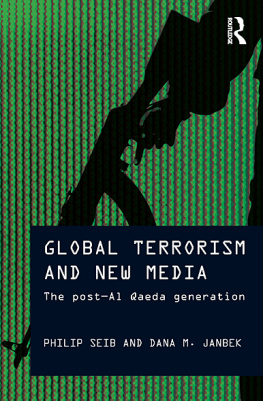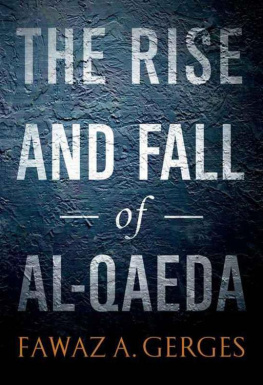The 7/7 London Underground Bombing: Not So Homegrown
Bruce Hoffman
A selection from The Evolution of the Global Terrorist Threat: From 9/11 to Osama bin Laden's Death, edited by Bruce Hoffman and Fernando Reinares

Columbia University Press
New York
Columbia University Press
Publishers Since 1893
New YorkChichester, West Sussex
cup.columbia.edu
Copyright 2014 Columbia University Press
All rights reserved
E-ISBN 978-0-231-53886-2
A Columbia University Press E-book.
CUP would be pleased to hear about your reading experience with this e-book at .
Scholarly research for this volume was made possible with a generous grant from the Real Instituto Elcano, Madrid, and the Center for Security Studies and Security Studies Program, Edmund A. Walsh School of Foreign Service at Georgetown University.


Cover design by Noah Arlow after an original design by Elliot Strunk / Fifth Letter
Cover image Getty Images
References to websites (URLs) were accurate at the time of writing. Neither the author nor Columbia University Press is responsible for URLs that may have expired or changed since the manuscript was prepared.
Contents
Both at the time of the July 7, 2005, London bombing attacks and since then, a misconception has often been perpetuated that this was entirely an organic or homegrown phenomenon of self-radicalized, self-selected terrorists.
Such arguments were widely cited in support of the then-fashionable contention that entirely homegrown threats had superseded those posed by al-Qaeda and that al-Qaeda was no longer a consequential, active terrorist force. Accordingly, many analysts and government officials concluded that the threat from al-Qaeda had in fact receded and that the main security challenge emanated completely from unaffiliated, self-selected, and self-radicalized individuals. The evidence that has come to light since the 2005 London attacks, however, points to precisely the opposite conclusion: that al-Qaeda was and is alive and kicking and that it has been actively planning, supporting, and directing terrorist attacks on a global canvas since at least 2004 and was certainly behind the 2005 London bombings. Hence, rather than an organic, entirely homegrown plot perpetrated by clean skins acting entirely on their own, al-Qaedas involvementand that of other terrorist organizationsis crystal clear.
The Bombings
At 8:50 a.m. on Thursday morning, July 7, 2005, three bombs exploded within fifty seconds of one another on three different London Underground (subway) trains.
Londons long experience with Irish terrorism coupled with extensive planning, drills, and other exercises ensured that the citys emergency services responded quickly and effectively in a highly coordinated manner. The initial deployment of emergency service personnel to the four blast sites entailed seventy-three ambulances and twelve response units, with many additional vehicles drawn from other sources. According to the official lessons learned report,
all five London Strategic Health Authorities played a part in the response and all London hospitals were placed on major incident alert, with 1,200 beds rapidly made available for more than 700 casualties arriving at accident and emergency departments over a period of several hours. The vast majority (more than 80%) were fit for discharge on the same day. Of the 103 casualties admitted to hospital, including 21 critically injured, three were to die of their injuries.
In the two hours following the explosions, some 200,000 people were evacuated from more than 500 trains as the entire London Underground was shut down while a network-wide security inspection was conducted.
The nearly simultaneous blasts, their horrific casualty toll, and the prospect that this was the opening salvo in a sustained terrorist campaign stunned the United Kingdom. Indeed, only weeks earlier, on June 2, the Joint Terrorism Assessment Center (JTAC), Britains principal governmental counterterrorism coordinating body, had concluded that at present there is not a group with both the current intent and the capability to attack in the UK and consequently downgraded the overall countrywide terrorism threat level.
The Bombers
From personal documents found at the attack sites, British authorities quickly established the bombers identities.
Mohammed Siddique Khan (MSK), the oldest of the group, was also its leader. There is nothing in his background that would necessarily suggest the trajectory into terrorism that his life followed. He was born in Leeds on October 20, 1974, the youngest of six children. Described as quiet, studious and never in trouble, his background and profile hardly fits the stereotype of the deranged, homicidally fanatical suicide terrorist. MSK was from a solidly middle-class background, held a university degree, was gainfully employed, had married, and had a daughter who was then eighteen months old. His wife, Hasina, was pregnant and miscarried the day of the bombing.
A graduate of Leeds Metropolitan University with a degree in business studies, MSK had been employed as a community worker, focusing on troubled and disadvantaged youth. Between 2001 and 2004, he was a teaching assistant at a local primary school, working with special-needs children and other students who had either behavioral problems or difficulties with learning the English language. Based on the evidence gathered about MSK, the parliamentary committee investigating the bombings observed that Khan, known widely as Sid, had a real talent and vocation for working with young people. He was highly regarded by teachers and parents, and had a real empathy with difficult children. Children saw him as a role model.
Although he claims not to have been observant in his youth, MSK was noticeably religious by 2001. However, the parliamentary investigative report noted that MSK was not aggressive, extreme or politicized in the way he spoke about religion to colleagues. He had spoken out against the 9/11 attacks at school. What stood out more, however, were increasing absences from work that eventually led to his going on sick leave from September 20 to November 19, 2004. MSK was subsequently dismissed after the school administration concluded he was not in fact ill but was claiming medical leave nonetheless; at about the same time MSK gave notice he was quitting anyway.
Shezad Tanweer was closest to MSK both in age and in their relationship, compared to the other two bombers. Born on December 15, 1982, he was the second of four children and the eldest son. A good student and excellent sportsman, Tanweers passion in life appeared to be cricket. He also practiced the martial art jujitsu. Tanweer attended Leeds Metropolitan University, where he studied sports science. He left university after only two years and then worked part-time in a fish-and-chips takeaway shop owned by his father. Unlike MSK, Tanweer had been religiously observant from a young age, although those who knew him state that he never expressed extremist views. Like MSK, however, Tanweer also defies the stereotypical image of the suicide terrorist as either a wild-eyed fanatic or someone uneducated or from an economically deprived background. People who knew him when he was a boy described his demeanor as calm, friendly, mature and modest and observed that he was popular with his peers. Tanweer also dressed fashionably and drove a red Mercedes that was a gift from his father, a prominent local businessman who drove a silver Mercedes and owned a profitable abattoir, a video rental store, and fish-and-chips shops. He in fact came from a family who appeared to epitomize the classic immigrant success story, seeming proof of the multiculturalism that Britain often boasts is woven into its society.

